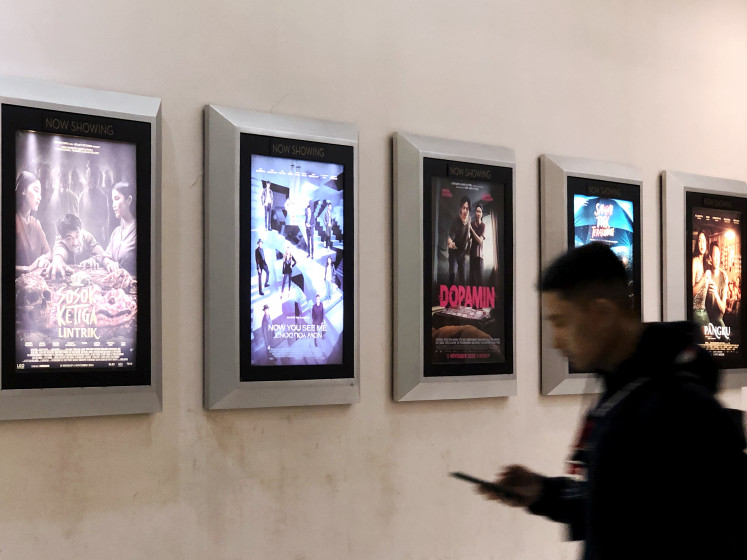Popular Reads
Top Results
Can't find what you're looking for?
View all search resultsPopular Reads
Top Results
Can't find what you're looking for?
View all search resultsGibran should take high road, by way of Surabaya
Like father like son: Gibran Rakabuming Raka (center), the eldest son of President Joko "Jokowi" Widodo, speaks to his followers as he seeks support for his bid to run in the Surakarta mayoral election on the Indonesian Democratic Party of Struggle (PDI-P) ticket at the party’s Central Java office in Semarang
Change text size
Gift Premium Articles
to Anyone
L
ike father like son: Gibran Rakabuming Raka (center), the eldest son of President Joko "Jokowi" Widodo, speaks to his followers as he seeks support for his bid to run in the Surakarta mayoral election on the Indonesian Democratic Party of Struggle (PDI-P) ticket at the party’s Central Java office in Semarang. Gibran is trying to emulate his father, who won the Surakarta mayoral post in 2002. (JP/Suherdjoko)
Among the more than 200 local elections to be held in September, one that has attracted national curiosity is the mayoral election in Surakarta, also known as Solo, in Central Java.
This midsized town of some 500,000 people and one of the cultural centers of Javanese heritage is central to Joko “Jokowi” Widodo’s political rise to the highest office in the country.
The then-furniture businessman became the first directly elected mayor of the city in 2005 and after seven years of leading it, won Jakarta’s gubernatorial election, before being elected president in 2014.
This time around, Gibran Rakabuming Raka, Jokowi’s eldest son, is following in his father’s footsteps by running for mayor. As a political novice, he will face institutional and electoral hurdles. While he could gain support from the central board of the Indonesian Democratic Party of Struggle (PDI-P), Gibran’s presence would disrupt the local chapter’s context.
Electorally, while Jokowi remained popular in Surakarta in the 2014 and 2019 presidential elections — by winning more than 80 percent of the vote, his 32-year old son would have to campaign feverishly to convince voters that he would elevate the city as he did in the last 15 years.
Nonetheless, in Surakarta, Gibran would have ridden an established political canoe toward a public office.
A higher road to strike would be to take on a more formidable challenge in running as the mayor of the second-largest city in the country, Surabaya, to succeed the internationally acclaimed Tri Rismaharini, or Bu Risma.
Risma was first elected as mayor in 2010 after more than 20 years serving in Surabaya’s city administration. She was then reelected in a landslide victory in 2015 and will conclude her term in early 2021. As the mayor for 3 million people, she has led a revival of the city into a modern metropolis and her accomplishments have been recognized internationally as she has been the president of the United Cities and Local Governments — Asia Pacific since 2018.
In transforming into an elected officer in 2010, she joined the PDI-P and has led the party to maintain a dominance in the city. The party leads in the City Council with 30 percent of seats in the current five-year term. For her accomplishments, she has risen as a national political figure in her own right and is a valued member of the PDI-P’s national executive committee under Megawati Soekarnoputri.
With such a strong PDI-P foundation in Surabaya, Gibran would enter the race with substantial leverage. His presence in the election would guarantee continued national exposure on the debate over the city’s future.
As with Surakarta’s PDI-P chapter, though, Gibran’s entrance into the race would be disruptive to Surabaya’s chapter. Risma’s deputy mayor, Wishnu Sakti Buana, has been the understudy for the last seven years in governing and organizing the party chapter. He has shown interest in succeeding Risma. The final decision of the party, however, remains with Megawati at the national committee.
More so than the party is Surabaya’s strong leaning toward Jokowi in the 2014 and 2019 presidential elections. In 2014, the President led by more than 24 percentage points over his challenger, Prabowo Subianto. Five years later, he widened the gap by securing 70 percent of the vote.
These returns were much stronger than the support he garnered in Jakarta, the city he governed in 2012-2014. In the first election, Jokowi won the capital only by around a seven-point margin, and even tighter by less than four points in April last year.
Surabaya followed a trend in East Java in 2019 where Jokowi managed to increase his votes across the region while Prabowo lost ground in most places. In the city, the President gained 23 percent more votes than in 2014 to a tad under 1.1 million, and the former Surakarta mayor won in all 31 subdistricts in the city, without exception. In those subdistricts, his lead expanded significantly, leaving Prabowo far behind. Of the 31 subdistricts, he won by more than a 20-point margin in 29 places, including in 17 where he won with more than 70 percent of the vote.
As with other districts in East Java, Prabowo lost his ground in so many areas. In Surabaya, his support evaporated by 6 percent to only around 470,000 votes in his tally, less than 30 percent support in this second-largest city in the country. He did gain votes in seven subdistricts but lost in the other 24 that put him at a deficit of almost 30,000 votes from 2014.
No doubt, Surabaya is a welcoming home to Jokowi in the presidential context. It could also be a warm place for Gibran to stake his political mark in the country.
Gibran could emulate Risma’s tidy administration and inject a millennial spirit into the city. One of the hurdles Gibran faces in running for Surabaya mayor is not related to political support but rather culture. It is whether “Arek-Arek Suroboyo” (Sons of Surabaya) will accept a “Wong Solo” (a person from Solo) as their flag barrier. It is a hurdle that a politician must overcome to prove themselves in the national and subnational political environment.
Take the high road, Gibran!
_________
Adi Abidin is a public affairs specialist at Inke Maris & Associates and research fellow at Populi Center, and Piebo Dimas Perdana is a political science alumnus of the University of Indonesia. The views expressed are their own.










